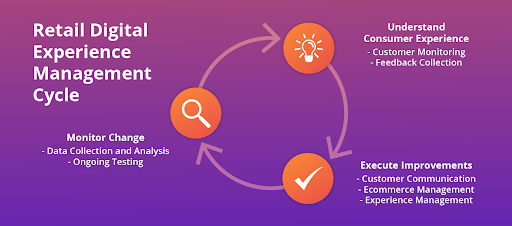Discover how a Digital Experience Manager enhances customer loyalty

Learn how a Digital Experience Manager can positively impact your digital experiences and overall customer satisfaction. These managers help engage your customers on all your digital touchpoints and deliver smooth customer experiences.
Highlights
You’ll learn about the importance of a digital experience manager (DXM):
- Enhances customer satisfaction: By personalizing interactions and ensuring seamless journeys, DXM increases engagement
- Improves business growth: Optimizes digital touchpoints, increasing conversion rates and brand loyalty
- Ensures brand consistency: Maintains uniform messaging across all channels
- Drives innovation: Adapts to trends and integrates automation tools for efficiency
What is a Digital Experience Manager?
A Digital Experience Manager is a marketing team member responsible for designing, implementing and optimizing customers' overall digital experiences across various touchpoints. They optimize your business’s website and mobile app traffic, customer experience and usability. As digital customers require instant rewards, Digital Experience Managers meet high customer expectations. Companies hire these managers to foster exceptional digital journeys and experiences. They help improve the customer journey to meet business goals and customer needs. Forward-thinking companies cannot overlook this role as it influences customer satisfaction, loyalty and the company's bottom line.
Start your free trial with Contentstack today. Transform your brand's digital presence with Contentstack's open MACH architecture and industry-leading technology. Witness a significant reduction in publishing and development time, and elevate your content management. Start your free trial now.
Responsibilities of a Digital Experience Manager
User experience (UX)
These managers create and implement the ultimate user experience (UX) plan. First, they identify the audience to understand the user persona, choices and issues. Using advanced technologies and design methods, these managers can optimize every digital touchpoint for usability and value. Companies expect them to test and iterate crucial strategy components, allowing adjustments based on user feedback and emerging trends.
Website and app design
A Digital Experience Manager designs how a website or app looks and functions. Often, they design the website and app from scratch, adding or modifying pages, content or functionalities. They even optimize the website and app for usability, speed and accessibility. Companies expect them to collaborate with IT and design teams.
Customer experience (CX)
Customer Experience (CX) is central to the work of a Digital Experience Manager. These managers use their skills to guide customers through their journey with your brand across all digital platforms. Managers focusing on CX ensure smooth, efficient, meaningful and personalized interactions. They make digital experiences engaging and satisfying by knowing customers' personas, behaviors and preferences.
Performance analysis
The Digital Experience Manager monitors your website performance. They analyze key performance indicators, such as site visits, conversion rates and load times. They can make or recommend changes to pages and functionalities based on the insights obtained. Managers even suggest necessary design changes.
Project management
When making changes to the website or app, managers need the approval of other employees, such as web developers and content writers. Additionally, the manager monitors progress using key performance indicators (KPIs), adjusting strategies to uphold deadlines and quality standards. The ability to manage projects from start to finish helps them drive meaningful outcomes.
What is digital experience management?
Digital experience management (DXM) is a process that monitors every customer interaction with a company's digital channels, which include mobile apps, websites, email, social media, intranet and more. As meeting customer expectations is a challenge, DXM simplifies the process.
This helps you understand customer journeys and use data-driven insights to refine these experiences. Digital experience management improves how people see your brand. It builds customer loyalty and helps your business grow. This is done by understanding what works well and what needs improvement. Effective DXM requires insights from different departments. The tools and techniques you use to manage digital experiences are collectively called a digital experience platform (DXP).

Digital experience vs customer experience
Aspect | Digital experience | Customer experience |
Definition | Interaction between customers and digital platforms, focusing on usability, design and functionality. | The overall perception a customer has of a brand covers all interaction points. |
Focus areas | User interface design, website and app functionality and online content accessibility. | Service quality, customer service and holistic brand interactions. |
Channels | Websites, mobile apps, social media platforms, digital kiosks. | Physical stores, call centers, online and offline touchpoints. |
KPI | Page load time, customer engagement metrics, bounce rates, conversion rates. | Net Promoter Score (NPS), Customer Satisfaction (CSAT), Customer Effort Score (CES). |
Examples | Seamless navigation on an e-commerce site, intuitive mobile app design. | Friendly in-store service and efficient problem resolution via customer support. |
Benefits of digital experience management
Personalized customer experiences
Through digital experience management, managers deliver personalized experiences that meet customers' behavior, needs and preferences. Using the data and insights obtained, managers develop engaging customer journeys at every digital touchpoint where your customer interacts.
Increased conversion rates
A well-managed digital experience enhances conversion rates by making customers easily navigate sale funnels. Improving each touchpoint makes the journey easier for potential customers. When the journey is simple, they are more likely to buy or sign up for a service, helping your business grow.
Agility and innovation
With an agile approach to DXP, you can respond to new trends and technological advancements. This flexibility stimulates innovation and makes digital experiences fresh and competitive. A retail company can gather feedback from customers who use the mobile app to shop and Digital Experience Managers can use the feedback to improve the online shopping experience.
Integrates with automation tools and services
Combining digital experience management systems with the latest automation tools increases business processes and improves how you interact with customers. You can automate tasks like data collection and marketing campaigns using these technologies, freeing resources for more strategic work. Automation tools connect different digital platforms, ensuring a smooth and consistent customer experience.
Higher ROI
Digital experience management improves your company's ROI, builds customer relationships and produces superior experiences. This intelligent use of advanced digital media makes customers happy and enhances the conversion rate. As a result, you receive a better and higher return on investment.
Why use Contentstack for your digital experience management?
Contentstack is a top digital experience management tool offering a headless architecture and digital experience platform (DXP). Its headless architecture decouples the back-end systems from the front-end user experiences, giving you more flexibility and creativity in content delivery. It promotes a modular and dynamic approach to managing digital content, making it easier to keep up with evolving customer expectations and technological changes.
Additionally, Contentstack’s DXP provides various tools for organizing, connecting and enhancing your digital presence. With APIs and microservices, you can update content and engage customers with seamless and timely experiences. DXPs make this process faster, which results in higher engagement rates, improved conversions and happier customers.
Case study: How did Cartier increase brand alignment and improve digital experiences with Contentstack's Composable DXP?
Cartier created many digital assets, but a lack of integration led to poor brand alignment, causing the team to lose time updating content.
The company needed solutions that offered coherent brand recognition, enhanced content use, decreased technical support dependency and improved digital experience quality. After thorough research, Cartier chose Contentstack’s composable DXP. The platform resolved integration issues, unified digital assets and improved brand alignment. Because of Contentstack, Cartier implemented an omnichannel strategy and increased the ROI on content assets.
After using Contentstack, Anastasia Goglova, International Digital Lead at Cartier, said:
“We have collapsed the time it takes for new sites to be developed from months to days, with early iterations of a new site submitted into our brand identity teams within hours. This has given our teams greater autonomy and means we combine agility and speed with a premium, high-end digital experience.”
You can read the complete case study here.
Contentstack: Your partner in scaling digital experiences. Twice named a Leader in Forrester's composable DXP award, Contentstack offers an innovative approach to DXP. Experience our 100% microservices architecture and API coverage that allows instant scalability. Start your free trial today.
FAQs
What is digital experience management?
Digital experience management (DXM) designs and optimizes interactions on digital platforms. It manages content, personalizes journeys, integrates automation tools and analyzes data to improve customer experience.
What does a Digital Experience Manager do?
A Digital Experience Manager performs the following duties:
- Improve the brand's online presence
- Coordinate campaigns
- Optimize websites
- Monitor social media
- Meet marketing objectives.
They work with other teams to create content, analyze metrics and use them to improve strategies.
Learn more
A Digital Experience Manager enhances how businesses and their customers connect through digital channels. They adopt digital experience management and digital experience platforms (DXP) like Contentstack that guarantee success and growth. By overcoming challenges, these managers help your company climb to new heights.
Talk to us about how Contentstack’s DXP offers unmatched flexibility and business growth.
About Contentstack
The Contentstack team comprises highly skilled professionals specializing in product marketing, customer acquisition and retention, and digital marketing strategy. With extensive experience holding senior positions in notable technology companies across various sectors, they bring diverse backgrounds and deep industry knowledge to deliver impactful solutions.
Contentstack stands out in the composable DXP and Headless CMS markets with an impressive track record of 87 G2 user awards, 6 analyst recognitions, and 3 industry accolades, showcasing its robust market presence and user satisfaction.
Check out our case studies to see why industry-leading companies trust Contentstack.
Experience the power of Contentstack's award-winning platform by scheduling a demo, starting a free trial, or joining a small group demo today.
Follow Contentstack on Linkedin





.svg?format=pjpg&auto=webp)
.svg?format=pjpg&auto=webp)
.png?format=pjpg&auto=webp)






.png?format=pjpg&auto=webp)


